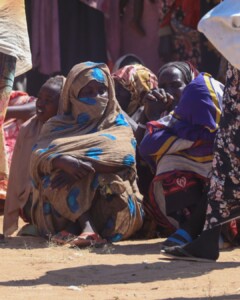‘Time running out for probe into Darfur rapes’: former Unamid spokesman
The United Nations Secretary-General has urged the Sudanese government to grant Unamid “unfettered access” to Tabit, North Darfur, to investigate the serious allegations of a mass rape by Sudanese soldiers there. Also the former spokesman of the Unamid, Aicha Elbasri, regrets the slow progress of the mission’s investigation. Secretary-General Ban Ki-Moon said that he is “deeply troubled” by the allegations, and stressed that only a full investigation by the Unamid will help shed light over the mass rape allegations. In a statement released today, he urged the Sudanese government to grant the mission unfettered access, without further delay, to Tabit and its population. Yesterday, Khartoum announced it does not permit the Unamid to visit Tabit a second time. The former spokesman of Unamid, Aicha Elbasri, strongly criticised Unamid in an interview with Agence de Presse Africaine. Her critique comes after Unamid stated it had not found any evidence for the incident after a visit to Tabit. During this visit on 9 November, the investigators were heavily accompanied by Sudanese military and police forces, which resulted in “an environment of fear and intimidation”, according to an internal UN report. Elbasri: “Unamid staffers should have protested against the presence of the government forces during their interaction with the villagers or call off the investigation altogether and alert the public about it. Unamid accepted the military presence and intimidation and concluded that the allegations were baseless.” ‘Unamid allowed evidence to disappear’ She pointed out that according to medical experts, it is now too late for the rape victims to provide the forensic evidence of such crimes, two weeks after the incident. “Unamid dragged its feet for ten long days […] the evidence has disappeared, the population was intimidated, and the government was in full control of the place,” Elbasri said. The former spokesman resigned from the mission last year. In April, she revealed that the mission had misinformed the UN by withholding important details about Darfur, and failed to protect civilians. Rape victim sympathisers on hunger strike Last week, activists in various countries embarked on a three-day hunger strike in solidarity with the many women and girls who fell victim to the mass rape in Tabit. Suhair Sa’eed, a women lawyer, activist, and one of the strikers spoke to Radio Dabanga from Khartoum on Friday. She said that a total of sixteen activists started their hunger strike on Sunday at 8 pm and continued until Wednesday at 8 pm. In Khartoum, seven people joined the strike, including five women lawyers and students, and two youths. Others Sudanese girls joined the hunger strike in Saudi Arabia, Egypt, and Nigeria. “We staged a hunger strike because we have nothing to offer the rape victims, but our strike,” Sa’eed explained. The strike was also in solidarity with the Darfuri students expelled from their dormitories, and women living in the Nuba Mountains and Blue Nile state, she said. Seventy women students from Darfur were evicted from their university dormitories in Khartoum on 5 October. Security forces raided the dormitory, forcibly evicted the remaining women students, and detained dozens of them. Photo: A group of Sudanese exiles protested outside London’s Downing Street on Saturday, against Sudan and the lack of action by Unamid, following claims of the mass rape (Khalid Ewais/Al Arabiya TV) Related: Sudan again blocks Unamid’s mass rape investigation (17 November 2014) Denial of Darfur rape case by Unamid shocks Tabit victims (11 November 2014) UN chief ‘deeply troubled’ by Darfur Mission’s silence (30 October 2014) Darfuri student suffers after beatings in detention: activist (20 October 2014)
The United Nations Secretary-General has urged the Sudanese government to grant Unamid “unfettered access” to Tabit, North Darfur, to investigate the serious allegations of a mass rape by Sudanese soldiers there. Also the former spokesman of the Unamid, Aicha Elbasri, regrets the slow progress of the mission's investigation.
Secretary-General Ban Ki-Moon said that he is “deeply troubled” by the allegations, and stressed that only a full investigation by the Unamid will help shed light over the mass rape allegations. In a statement released today, he urged the Sudanese government to grant the mission unfettered access, without further delay, to Tabit and its population. Yesterday, Khartoum announced it does not permit the Unamid to visit Tabit a second time.
The former spokesman of Unamid, Aicha Elbasri, strongly criticised Unamid in an interview with Agence de Presse Africaine. Her critique comes after Unamid stated it had not found any evidence for the incident after a visit to Tabit. During this visit on 9 November, the investigators were heavily accompanied by Sudanese military and police forces, which resulted in “an environment of fear and intimidation”, according to an internal UN report.
Elbasri: “Unamid staffers should have protested against the presence of the government forces during their interaction with the villagers or call off the investigation altogether and alert the public about it. Unamid accepted the military presence and intimidation and concluded that the allegations were baseless.”
'Unamid allowed evidence to disappear'
She pointed out that according to medical experts, it is now too late for the rape victims to provide the forensic evidence of such crimes, two weeks after the incident.
“Unamid dragged its feet for ten long days […] the evidence has disappeared, the population was intimidated, and the government was in full control of the place,” Elbasri said. The former spokesman resigned from the mission last year. In April, she revealed that the mission had misinformed the UN by withholding important details about Darfur, and failed to protect civilians.
Rape victim sympathisers on hunger strike
Last week, activists in various countries embarked on a three-day hunger strike in solidarity with the many women and girls who fell victim to the mass rape in Tabit.
Suhair Sa'eed, a women lawyer, activist, and one of the strikers spoke to Radio Dabanga from Khartoum on Friday. She said that a total of sixteen activists started their hunger strike on Sunday at 8 pm and continued until Wednesday at 8 pm. In Khartoum, seven people joined the strike, including five women lawyers and students, and two youths. Others Sudanese girls joined the hunger strike in Saudi Arabia, Egypt, and Nigeria.
“We staged a hunger strike because we have nothing to offer the rape victims, but our strike,” Sa'eed explained. The strike was also in solidarity with the Darfuri students expelled from their dormitories, and women living in the Nuba Mountains and Blue Nile state, she said.
Seventy women students from Darfur were evicted from their university dormitories in Khartoum on 5 October. Security forces raided the dormitory, forcibly evicted the remaining women students, and detained dozens of them.
Photo: A group of Sudanese exiles protested outside London's Downing Street on Saturday, against Sudan and the lack of action by Unamid, following claims of the mass rape (Khalid Ewais/Al Arabiya TV)
Related:
Sudan again blocks Unamid's mass rape investigation (17 November 2014)
Denial of Darfur rape case by Unamid shocks Tabit victims (11 November 2014)
UN chief ‘deeply troubled’ by Darfur Mission's silence (30 October 2014)
Darfuri student suffers after beatings in detention: activist (20 October 2014)











 and then
and then